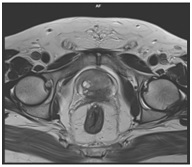Role of Multiparametric MRI in Diagnosis of Prostate Cancer
Abstract
Aims: The main objectives of our study were to evaluate the role of Multiparametric MRI (mp-MRI) in diagnosis of carcinoma prostate and to compare the various MRI sequences used in MRI in evaluating carcinoma prostate with histopathological diagnosis kept as reference standard.
Materials and Methods: This prospective cross-sectional study of 40 patients was performed by using various sequences used in mp-MRI i.e. T2 weighted imaging (T2WI), Diffusion Weighted Imaging (DWI), Magnetic Resonance Spectroscopy (MRS) and Dynamic Contrast Enhanced study (DCE). Findings of mp-MRI sequences were compared with histopathological diagnosis. Statistical analysiswasperformed using SPSS computer statistical program for window release 16.
Results: Sensitivity, specificity, positive predictive value (PPV), negative predictive value (NPV) of DCE in diagnosing carcinoma prostate were 88.89%, 50.00%, 94.12% and 33.33% respectively where assensitivities, specificities, PPVs, NPVs of DWI and MRS were same in our study i.e. 94.44%, 75.00%, 97.14% and 60.00%respectively. Overall sensitivity, specificity, PPV, NPV of mp-MRI by combining these sequences were found to be 97.22%, 75%, 97.22% and 75% respectively. Diagnostic accuracies of DWI, DCE and MRS were 92.5%, 85% and 92.5% respectively and overall diagnostic accuracy after combining these sequences in mp-MRI was 95%.
Conclusions: mp-MRI including all the sequences has very good role in evaluation of carcinoma prostate. Diagnostic accuracy of mp-MRI increases when all sequences used together to assess prostatic lesions, so all the sequences should be used together in prostate cancer evaluation rather than using individual sequences.
Downloads
References
Siegel R, Ma J, Zou Z, Jemal A. Cancer statistics, 2014. CA Cancer JClin. 2014;64 (1):9-29.
Schimmöller L, Quentin M, Arsov C, Hiester A, Buchbender C, Rabenalt R et al. MR-sequences for prostate cancer diagnostics: validation based on the PI-RADS scoring system and targeted MR-guided in-bore biopsy. European radiology. 2014; 24(10):2582-9.
Petrillo A, Fusco R, SetolaSV,Ronza FM, Granata V, Petrillo M et al. Multiparametric MRI for prostate cancer detection: Performance in patients with prostate‐specific antigen values between 2.5 and 10 ng/mL. Journal of Magnetic Resonance Imaging. 2014;39(5):1206-12.
Ravizzini G, Turkbey B, Kurdziel K, Choyke PL. New horizons in prostate cancer imaging. European journal of radiology. 2009; 70(2):212-26.
Puech P, Huglo D, Petyt G, Lemaitre L, Villers A. Imaging of organ-confined prostate cancer: functional ultrasound, MRI and PET/computed tomography. Current opinion in urology. 2009;19(2):168-76.
Gibbs P, Pickles MD, Turnbull LW. Diffusion imaging of the prostate at 3.0 tesla. Investigative radiology. 2006; 41(2):185-8.
Fuchsjäger M, ShuklaDave A, Akin O, BarentszJ,Hricak H. Prostate cancer imaging. Act a Radiol 2008;49:1072 0.
ZakianKL,Sircar K, Hricak H, Hui-Ni C, Dave AS, Ebehardt S et al. Correlation of proton MR spectroscopic imaging with gleason score based on step-section pathologic analysis after radical prostatetectomy. Radiology.2005; 234(3)804-14.
Delongchamps NB, Rouanne M, Flam T, Benvon F, Literatore M, erbib M et al. Multiparametric magnetic resonance imaging for the detection and localization of prostate cancer: combination of T2- weighted, dynamic contrast-enhanced and diffusion-weighted imaging. BJU Int. 2011;107:1411-18.
A Verma S, Turkbey B, MuradyanN,Rajesh . Overview of Dynamic MRI in prostate cancer diagnosis and management.AJR 2012 Jun;198(6):1277-88.
Kurhanewicz J, Vigneron D, Carroll P, Coakley F. Multiparametric magnetic resonance imaging in prostate cancer: present and future. Current opinion in urology. 2008; 18(1):71-7.
Aydin H, Kizilgöz V, Tatar IG, Damar C, Ugan AR, Paker I, Hekimoğlu B. Detection of prostate cancer with magnetic resonance imaging: optimization of T1-weighted, T2-weighted, dynamic-enhanced T1-weighted, diffusion-weighted imaging apparent diffusion coefficient mapping sequences and MR spectroscopy, correlated with biopsy and histopathological findings. 2012; 36(1):30-45.
Tamada T, Prabhu V, Li J, Babb JS, Taneja SS, Rosenkrantz AB. Prostate cancer: diffusion-weighted MR imaging for detection and assessment of aggressiveness comparison between conventional and kurtosis models. Radiology. 2017 Apr 10; 284(1):100-8.
Reinsberg SA, Payne GS, Riches SF, Ashley S, Brewster JM, Morgan VA et al. Combined use of diffusion-weighted MRI and 1H MR spectroscopy to increase accuracy in prostate cancer detection. 2007; 188(1):91-8.
Yamamura J, Salomon G, Buchert R, et al. MR Imaging of Prostate Cancer: Diffusion Weighted Imaging and (3D) Hydrogen 1 (1H) MR Spectroscopy in Comparison with Histology. Radiology Research and Practice. 2011;616852:1-9.
Jagannathan D, Indiran V. Accuracy of Diffusion Weighted Images and MR Spectroscopy in Prostate Lesions–Our Experience with Endorectal Coil on 1.5 T MRI. Journal of clinical and diagnostic research: JCDR. 2017; 11(5):TC10.
AbdelMaboud NM, Elsaid HH, Aboubeih EA. The role of diffusion–Weighted MRI in evaluation of prostate cancer. The Egyptian Journal of Radiology and Nuclear Medicine. 2014;45(1):231-6.
Kurhanewicz J, Vigneron DB.Advances in MR spectroscopy of the prostate. Magnetic resonance imaging clinics of North America. 2008 Nov 1;16(4):697-710.
Anderson ES, Margolis DJ, Mesko S, Banerjee R, Wang PC, Demanes DJ et al. Multiparametric MRI identifies and stratifies prostate cancer lesions: implications for targeting intraprostatic targets. Brachytherapy. 2014;13(3):292-8.
Thestrup KC, Logager V, Baslev I, Møller JM, Hansen RH, Thomsen HS. Biparametric versus multiparametric MRI in the diagnosis of prostate cancer. Acta radiologica open. 2016;5(8):1-8.
Tanimoto A, Nakashima J, Kohno H, Shinmoto H, Kuribayashi S. Prostate cancer screening : the clinical value of diffusion-weighted imaging and dynamic MR imaging in combination with T2-weighted imaging. 2007;25(1):146-52.
Abd-Alazeez M, Kirkham A, Ahmed HU, Arya M, Anastasiadis E, Charman SC et al. Performance of multiparametric MRI in men at risk of prostate cancer before the first biopsy: a paired validating cohort study using template prostate mapping biopsies as the reference standard. Prostate cancer and prostatic diseases. 2014; 17(1):40-6.
Hauth E, Hohmuth H, Cozub-Poetica C, Bernand S, Beer M, Jaeger H. Multiparametric MRI of the prostate with three functional techniques in patients with PSA elevation before initial TRUS-guided biopsy. The British journal of radiology. 2015; 88(1054):20150422.
Ahmed HU, Bosaily AE, Brown LC, Gabe R, Kaplan R, Parmar MK et al. Diagnostic accuracy of multi-parametric MRI and TRUS biopsy in prostate cancer (PROMIS): a paired validating confirmatory study. The Lancet. 2017; 389(10071):815-22.



 OAI - Open Archives Initiative
OAI - Open Archives Initiative


